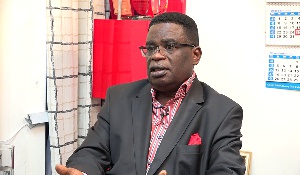 Dr, Kofi Mbiah, CEO of Ghana Chamber of Shipping
Dr, Kofi Mbiah, CEO of Ghana Chamber of Shipping
Chief Executive Officer of the Ghana Chamber of Shipping, Dr. Kofi Mbiah, and other seasoned players in the blue economy have unanimously admitted that potentials of the country’s ocean resources have not been fully exploited to cushion its socio-economic growth.
“There is so much room to explore in order to fully harness the potential of the blue economy to the country.
“If you were to look at how one of the various areas of the blue economy complement the other areas, you will realise that the potential is huge. Unfortunately, we are very limited as to the way in which we harness these resources,” Dr. Mbiah expressed as a panellist on the GPHA’s Eye on Port live interactive programme.
According to the astute maritime lawyer, investments into the maritime sector have been concentrated on port development even though there remain varied opportunities that the ocean offers for the blue economy.
It has been projected that about 5.4 million jobs could be created globally due to the infinite resources offered by the ocean.
Discussions on the maritime sector have often revolved around the ports, shipping etc. – but there are other viable aspects which include shipbuilding, construction in the sea, port development, transportation, oil and gas, aquaculture, fishery, tourism, and recreation.
“I agree with my seniors that we are not taking full advantage of this blue economy,” Deputy Minister of Transport, Daniel Nii Kwatei Titus-Glover – who was also on the panel, said when seconding the assertion, urging the introduction of a comprehensive maritime policy that would narrow the country’s interests toward the highly prospective maritime industry.
Mr. Titus-Glover also called for increased use of Ghana’s inland water resources to alleviate the burdened seaports and called for more assistance from the private sector via investments.
“We want to explore the potential of the Volta Lake. We have done some studies and we will be creating about 2 to 3 ports on the Volta Lake to be able to continue the blue economy business around that stretch,” he disclosed.
The deputy transport minister also revealed that a new comprehensive transport policy is to be rolled out soon that will address growing needs of the blue economy, otherwise known as the maritime industry.
Dr. John York Abaidoo, Dean at the School of Graduate Studies, Regional Maritime University, in exposing the lack of opportunities for trained marine professionals called for local content legislation that will bind ships calling at the country’s coast to have onboard Ghanaian crewmen.
He said: “Shipping and marine service companies doing business in the country should take up graduates of the RMU; and as a matter of seriousness, legislation should be passed whereby local participation for ship’s crew is mandatory.
“The problem here is legislation. I know that when local content laws become operative, then we will have the power to say every ship visiting our coast should carry at least one local crewman. I believe that can also help us.”
The panellists also recommended that the curriculum of various training institutions of the sector – specifically the Regional Maritime University (RMU) and the Chartered Institute of Logistics and Transport (CILT Ghana) – must be adjusted to meet modern industry demands.
“Skilled human resources can be trained to harness a broader job market relevant to the trends of the dynamic blue economy and even beyond,” Dr. Mbiah advised.